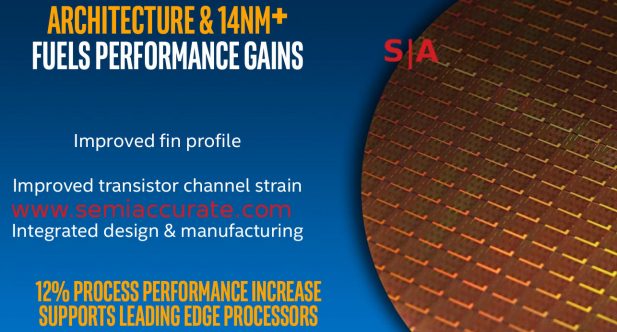 It looks like Intel’s process technology has finally narrowed the gap to Samsung, it is now less than a year. SemiAccurate thinks this is a bit of a misleading number though, if you look at the tech, Samsung’s process is still better.
It looks like Intel’s process technology has finally narrowed the gap to Samsung, it is now less than a year. SemiAccurate thinks this is a bit of a misleading number though, if you look at the tech, Samsung’s process is still better.
With the innovation in Intel’s Kaby Lake 7th Generation Core CPU line, the process improvements Intel brought to bear have been lost in the buzz. This is unfair because according to the presentations provided by Intel, they have finally narrowed the timing gap to industry leader Samsung on process technology. Timing isn’t the only important part of a process though, the technology matters too and Intel has a lot more work to do there if they want to catch Samsung.

Slideware can hide performance gaps
Intel provided the data in their Kaby Lake briefing to show how much they narrowed the timing gap to Samsung. Intel released their second generation 14nm FinFET process called 14nm+ this week, Samsung released theirs on January 14, 2016. While SemiAccurate may be exaggerating a bit by calling this gap 3Q, 8.5 months is still less than a year. As long as Intel’s release is to be taken at face value like they want it to be, the progress they made is still remarkable.
From there things get worse as long as the advances Intel claims are valid. SemiAccurate thinks Intel is being above board with their claims of a 12% performance jump over their vanilla 14nm process. Unfortunately they are lagging badly behind Samsung here too, and by more than the one year introduction gap.
If you read the above Samsung release carefully you will see why we say this, they claim, “Samsung’s new 14nm LPP process delivers up to 15 percent higher speed and 15 percent less power consumption over the previous 14nm LPE process through improvements in transistor structure and process optimization.” Intel claims only a “12% process performance increase” but not a power decrease. Taken together because of the word “and”, Samsung has a 22.5% gain from their second generation 14nm FinFET process. Yes that is nearly 2x the gain Intel got.
At this point we are going to be kind and congratulate Intel on narrowing the timing gap to Samsung and wish them well in their endeavors in doing the same on the performance front. Without details on what they are doing, we have to take the company at their word, something which makes it clear how badly they are being beaten by the Korean giant. Intel fought back valiantly when TSMC beat them to 3D by a little bit but this time the battle looks to be much more lengthy.
Luckily for Intel they have a long history of telling the truth and not hiding behind blurry marketing slides meant to mislead through selective disclosures and curiously chosen benchmarks. With the tour-de-force that is Kaby Lake, it is clear that Intel does not need to mislead the public like others do, and have done to them in the past, the numbers shine through in the end. Just remember, when you try to play games where the rules are set by unethical opponents, you can’t win. At least on the technology front, Intel’s 14nm+ process disclosures show they are finally catching up to the leaders in the foundry world.S|A
Charlie Demerjian
Latest posts by Charlie Demerjian (see all)
- Qualcomm Is Cheating On Their Snapdragon X Elite/Pro Benchmarks - Apr 24, 2024
- What is Qualcomm’s Purwa/X Pro SoC? - Apr 19, 2024
- Intel Announces their NXE: 5000 High NA EUV Tool - Apr 18, 2024
- AMD outs MI300 plans… sort of - Apr 11, 2024
- Qualcomm is planning a lot of Nuvia/X-Elite announcements - Mar 25, 2024